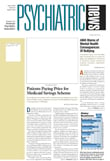Treating addicts poses major ethical ambiguities. Behavior-related diseases have always been a source of frustration for health care practitioners, and substance use disorders, particularly heroin addiction, are especially problematic.
The addict’s compulsive pursuit of disease over health defies many of the basic tenets of our profession and provokes conflict in us. As I train to become an addiction psychiatrist, I often wonder whether the problems may lie in our formulation of the illness and our expectations of ourselves as physicians. How comfortable can we make addicts without being complicit in their self-destruction? How far can we reasonably go to “meet the patient on his/her own terms”? These questions are unavoidable as we develop treatment strategies to address the complex and refractory nature of substance use disorders.
Harm reduction represents the most politically radical approach to addiction. It stands on the principle that total, sustained abstinence is but one of many favorable outcomes. Being addicted to heroin but not contracting HIV, hepatitis C, cellulitis, endocarditis, and so on are others. As a part of my fourth-year elective in addiction psychiatry, I had the opportunity to spend time in the Lower East Side Harm Reduction Center in New York City, a needle-exchange program that is funded largely by the city’s Department of AIDS Services.
The center serves as a needle exchange and provides many ancillary services to addicts, including infectious disease tests, primary care medicine, massage and acupuncture, detox support, and referral to treatment. Studies have shown that needle-exchange programs prevent HIV infection and hepatitis—and at a very modest cost. Evidence refutes the fear that these programs promote IV drug use.
The exchange, one of 12 in New York City, serves 2,814 enrolled participants and had collected 519,887 needles when I was there. The center itself is shabby but homey, with sofas set around a coffee table, topically relevant literature organized in racks on the walls, and a chalkboard noting drugs to avoid, for example, “Stay away from Fentanyl—six deaths in one week.” Tourniquets, sterile water, alcohol preps, cotton balls, cookers, condoms, and dental dams are provided in addition to sterile syringes. Neighboring restaurants donate food, and the center offers movies, self-defense classes, and free dog food for participants’ pets.
New enrollees are required to sit through a demonstration of safe injection techniques. The demographics of the center’s population defy stereotype; the only thing that clients appear to have in common is pinpoint pupils.
Nonetheless, it can be a stretch to feel on solid ethical ground in an environment that does so much to improve the quality of the addict’s experience of addiction, to participate actively in abetting overtly self-destructive behavior. Our culture’s position on immoderation has never been ambiguous. Historically, we have deemed “out-of-control” behavior immoral, and on the subject of inebriety we have been consistently punitive. On the one hand, for an adolescent to be protected against the possibility of infection with a devastating virus while he or she “experiments” with IV heroin use is a worthy effort. On the other hand, with a disease that is to a large degree tempered by social reinforcement, are we encouraging use by not discouraging it?
Yet despite society’s consistently unequivocal discouragement, heroin addiction is on the rise. And as the greatest risk factor for the most devastating and expensive to treat of infectious diseases, intravenous drug use continues to move up on the list of public health concerns.
The onus of addressing these issues falls largely on psychiatry—where else can chronic, maladaptive behavioral issues be addressed in a clinical and nonjudgmental environment? And if total sustained abstinence is the highest goal to which we can aspire, isn’t the disease-free addict more likely to attain it?
Models of chronic medical conditions such as diabetes and hypertension are frequently used as analogies for better understanding the nature of addictive disease, and the parallels are striking. Often the best we can do as physicians is to mitigate outcome by managing symptoms. Still in its infancy, the field of addiction psychiatry is faced with ever-increasing prevalence of disease, limited treatment options, and insufficient resources.
If the harm-reduction approach lies close to the boundaries of our ethics, perhaps our ethics need to be reevaluated to compensate for the inadequacies of what we presently have to offer those of us who suffer from substance use disorders. ▪
